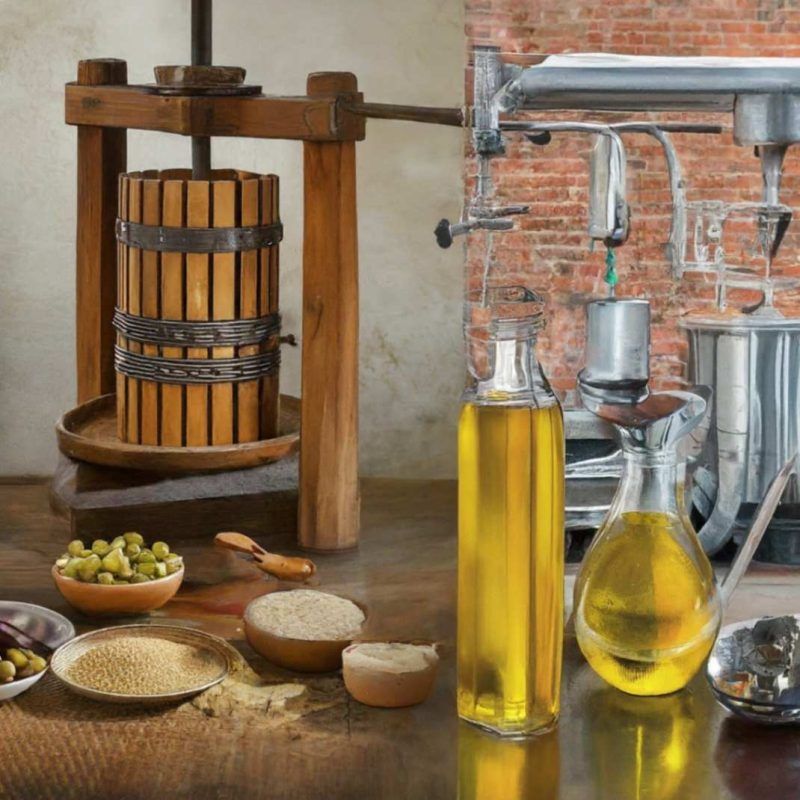When it comes to healthy cooking, fat plays a starring role. But with so many oil options on the shelf, choosing the right one can be confusing. Today, we’ll tackle the age-old question: wood-pressed oils vs. refined oils. We’ll delve into the extraction methods, explore their nutritional profiles, and help you decide which oil best suits your culinary creations and health goals.
Nutritional Comparison: Wood-Pressed Oils vs. Refined Oils
Wood-pressed oils are healthier because they’re made naturally, preserving more nutrients, antioxidants, and flavour. They don’t use chemicals or high heat in processing. Refined oils, however, lose nutrients due to extensive processing and may contain harmful additives. While refined oils last longer and taste plain, wood-pressed oils are better for your health and taste more natural and flavorful.
Understanding Nutritional Differences
Wood-pressed oils are healthier because they retain nutrients and natural flavours naturally, without chemicals or high heat. In contrast, refined oils lose nutrients and might include harmful additives due to intense processing. Wood-pressed oils provide better nutrition and a richer, more authentic flavour than refined oils.
Why Choose Wood-Pressed Oils?
Go for wood-pressed oils for their natural benefits. They keep more nutrients and flavours because they’re made without chemicals or high heat. Refined oils lose these advantages through extensive processing that can add harmful substances. Wood-pressed oils provide better nutrition and taste, giving you the best for your health and cooking enjoyment.
The Environmental Impact of Oil Production
Oil production harms the environment in several ways. Drilling and fracking disrupt ecosystems and pollute water. Transporting oil via pipelines or tankers risks spills that damage habitats. Burning oil releases greenhouse gases, worsening climate change. Oil spills harm wildlife and coastal areas. Extracting oil from tar sands or deep seas uses lots of energy and causes more environmental damage. To protect the environment, we need strict rules, to invest in clean energy, promote energy efficiency, and reduce our use of fossil fuels.
Cooking with Wood-Pressed Oils
Cooking with wood-pressed oils makes food tastier and healthier. These oils are natural, and extracted without chemicals or high heat, so they keep more nutrients and antioxidants than refined oils. They add a richer, more genuine flavour to dishes like sautéed vegetables, salads, or marinated meats. With a high smoke point, they’re great for cooking in different ways while keeping food nutritious and delicious.
Traditional Extraction Methods
Wood-pressed oils are made using traditional methods that focus on natural processes rather than modern refining techniques. It starts with carefully choosing top-quality seeds or nuts that are clean and dry. This slow, cold-pressing process preserves the natural flavours, nutrients, antioxidants, and vitamins present in the seeds or nuts.
Cold Pressing
Cold pressing is an important part of making wood-pressed oils. Unlike refined oils that use high temperatures, cold pressing keeps the temperature below 50°C (122°F). This control is critical because it stops delicate compounds like antioxidants and essential fatty acids from breaking down, which can happen at higher temperatures. By protecting these good-for-you parts, cold pressing makes sure the oil tastes great and has lots of nutrition, making it healthier too.
Wooden Presses
Wood-pressed oils are made using wooden presses that gently squeeze seeds or nuts without adding heat. This slow method allows the oil to drip out naturally, keeping it natural and pure. Depending on the type of seed or nut used, it takes varying times to extract the oil for different flavours. After extraction, the oil is filtered to remove any particles, making it clear and pure. To maintain its freshness and preserve its nutrients and natural flavours, the oil is stored in cool, dark places.
Picking wood-pressed oils helps the environment because it uses less energy and doesn’t harm the Earth as much as making oils in big factories. This old-fashioned way keeps the oils real and good for you, making food taste even better with richer flavours.
Health Claims
People sometimes think refined oils are healthier because they look clear and last longer. But refining removes natural nutrients and antioxidants, making them less nutritious. Some refined oils may even contain harmful additives added during processing.
Purity and Safety
Some think refined oils are better because they’re clear and last longer. But refining uses harsh chemicals and heat that strip away natural flavour and nutrients, possibly leaving harmful chemicals behind.
Natural oils, like wood-pressed ones, are made without strong chemicals or high heat. They contain more antioxidants and nutrients, which are good for your health and make food taste better. Knowing this helps you choose the healthiest oils for cooking.
How to Choose Quality Wood-Pressed Oils
Tips for Selecting the Best Oils
When choosing wood-pressed oils, make sure they’re good quality and real to get the most health benefits and best taste.
Checking Labels
When picking oils, check the labels first. Go for oils labelled “wood-pressed,” “cold-pressed,” or “expeller-pressed.” These methods retain the oil’s nutrients and flavour since they avoid high heat or chemicals. Steer clear of oils labelled “refined” or “processed” as they may have lost their goodness during harsh treatments.
Trusted Brands
Pick oils from brands you trust or local producers known for good quality. Look at the company’s reputation and read reviews from customers to make sure they’re dependable and real. Well-known brands often have strict quality checks and tell you where they get their oil and how they make it.
Certification and Standards
Check for certifications like USDA Organic, FSSAI, or local organic standards. These certifications guarantee that the oil meets certain quality and safety rules, including no harmful chemicals or genetically modified ingredients. Organic certification also shows that the oil was made using sustainable farming methods.


